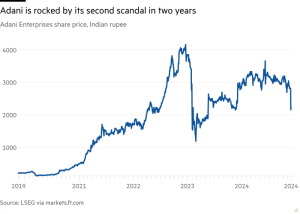the rightwing ‘Project 2025’ think-tank banking on Donald Trump
Kevin Roberts, president of the Heritage Foundation think-tank and architect of its controversial Project 2025 policy manifesto, spoke glowingly of his ties to Donald Trump back in May.
“I have become personally close to the president,” Roberts told the Financial Times at his office near the US Capitol building in Washington. “And we speak often.”
Roberts was confident Trump would embrace and adopt many of Project 2025’s recommendations, and in doing so “usher in the most glorious golden age of conservative reform since Ronald Reagan”.
Heritage had an “understanding based on conversations with president Trump and his associates that some large percentage of these recommendations will be in the mix for implementation”, Roberts said.
A few months later, as one of the tightest White House races ever enters its frantic final stretch, Roberts, Project 2025 and Heritage itself have been frozen out — temporarily, at least — from the Trump orbit.

Project 2025, including large sections written by former Trump administration officials, offers a draconian menu of radical conservative action plans if the Republican returns to the White House next year.
Among the proposals are the drafting in of ideologically loyal civil servants, collecting data on abortions and limiting the use of abortion pills, strict curbs on illegal immigration to ease detention and deportation, banning pornography, and limiting contraception.
Trump has vowed to carry out some of the same plans on the campaign trail. But Project 2025 has become so toxic — and such an obvious point of attack for Democrats — that the former president and his allies now insist they have nothing to do with it.
“The only official second-term policies are those that come from president Trump and his campaign directly,” Karoline Leavitt, the Trump campaign’s spokesperson said last week.
Earlier this year, Trump himself said of Project 2025 that he had “no idea who is behind it”, labelling some of its plans as “ridiculous and abysmal”. Chris LaCivita, his campaign manager, said Heritage was a “pain in the ass”. Howard Lutnick, Trump’s transition chief in charge of personnel, called Project 2025 “radioactive” in a recent FT interview.
But with just one week to go before the November 5 election, the Heritage document remains an albatross around Trump’s neck as he makes his final pitch to voters.
Kamala Harris, Trump’s Democratic rival, keeps mentioning it at rallies and ads across the battleground states that will decide the race, and her campaign believes it is a powerful guide to the extreme policies the former president would enact if he wins.
“Just google Project 2025,” Harris said at a recent rally in Atlanta, Georgia. “Can you believe they put that thing in writing? . . . It is a detailed and dangerous blueprint for what Donald Trump will do if he is elected president.”
The 922-page blueprint for a Republican administration is not new. Heritage launched it in April 2023. But the document’s radical agenda has thrust Heritage into the political spotlight in a way that is exceedingly rare, if not unprecedented, in the august world of American think-tanks.
This furore has sharply raised the stakes for Heritage when it comes to the White House race. A Trump win would be a big boost for the think-tank and its leaders. But Heritage will face a backlash if he loses again.
“If Trump wins, all the criticism of Project 2025 aside, Heritage is going to be in a good position. I think if Trump loses, they are going to be blamed a lot,” said Derek Scissors, a senior fellow at the American Enterprise Institute, another right-leaning think-tank, and a former Heritage analyst who still works with them on US-China relations.
Close observers of Heritage says its status as a political lightning rod follows its evolution to become more populist over the past decade.
The shift started in 2014, they say, when Jim DeMint, a former South Carolina senator who led the Tea Party movement, became its president and its political arm — called Heritage Action — clashed with Republican leaders on Capitol Hill.
Over the years, Heritage has become more isolationist on foreign policy and more focused on social issues. Then came Roberts, the former head of Wyoming Catholic College who later worked for a conservative policy group in Texas. He was appointed to run Heritage in October 2021 and has aggressively promoted its work since then.
“We are in the process of the second American revolution, which will remain bloodless if the left allows it to be,” Roberts told the War Room, a podcast run by Trump’s former political adviser Steve Bannon, in July.
EJ Fagan, a professor of political science at the University of Illinois-Chicago who has written a book on the rise of partisan think-tanks, said of Roberts that it “feels like he wants to be a Fox News host as much as he wants to be the president of a research organisation”.
Roberts has revealed “the stuff that conservative activist class really wants, which is deeply unpopular”, Fagan said, referring to Project 2025. But it is also a “pretty good representation of what the people who will eventually be appointed to [Trump’s] government want”, he added.
Critics say that in the heat of the campaign season, Roberts overplayed his hand, becoming too strident for Trump and other Republicans needing to win over more moderate voters.
One conservative leader who spoke to the FT said the think-tank should have quietly done its work and handed it to the Trump team after the election. “It was a total blunder,” said the conservative leader.
One well-known veteran conservative policy analyst in Washington told the FT he was considering taking his time at Heritage off his public resume.
Roberts has pushed back defiantly. In September, he told Fox News that Heritage would come back with another plan next election cycle, and “punch them [Democrats] back in the nose”.
Eli Lehrer, a former Heritage analyst who is now president of the R Street Institute, another right-leaning think-tank, said the characterisation of Project 2025 had been overdone.
“If you’re progressive, you have lots of reasons to dislike it, and conservatives also have reasons to dislike it,” Lehrer said. “Is it some deeply sinister plan to build a fascist theocracy? No, it isn’t.”
Heritage remains flush with cash, supported by large and small donors, which could help it survive the scrutiny regardless of the election outcome.
In 2022, it received more than $95mn in contributions and grants, and had net assets worth $332mn, according to its latest federal filing. But Heritage is also facing growing competition from other Washington think-tanks that are aligned with Trump but less associated with Project 2025.
If the former president wins, all eyes will be on whether Heritage and Roberts will be brought back into the fold — and whether their ideas are implemented. Roberts said “final decisions” on policy would be made by Trump, and his think-tank had “genuine humility” about its role.
“Neither I as a person or Heritage as an enterprise, nor any of the organisations that are part of Project 2025, are so presumptuous as to say that we are going to dictate what president Trump or any elected president is going to do,” Roberts said.
US Election Countdown
Sign up to our US Election Countdown newsletter, your essential guide to the twists and turns of the 2024 presidential election
#rightwing #Project #thinktank #banking #Donald #Trump






